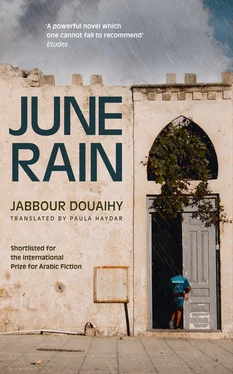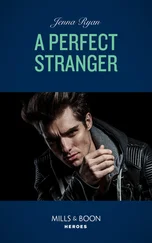Muhsin was the millstone hero. We knew that he shared his barricade with his brother, though — Muhsin during the day and Halim at night. Muhsin was our warrior at the front line. We followed him in combat, though from a distance, for we didn’t dare approach where he sat as we believed he was in the line of fire. He handed over the barricade to his brother at eight o’clock — exactly dinner time. Before handing it over he checked every direction through his long barrel rifle, aiming one last time in the direction of the opposing barricades. Just aiming, in his usual boring way. He took his rifle with him, along with his wicker chair and the cushion he put on it to keep his clothes from getting dirty. He never sat down on that chair without brushing off the dust first.
That’s what he did whether he was at the barricade, at home or at the café. He kept his rifle clean, his pants perfectly creased and his shirt collar white as snow. He would send the waiter at the café back to the kitchen with whatever he tried to serve him if he glimpsed the tiniest smear on his water glass or sniffed some odour only the most sensitive nose could detect, like the faint smell of soap lingering on his coffee cup. His brother would take control of the barricade with hardly any exchange of words. Sometimes we happened to witness Halim’s arrival, during the few days when we rebelled against the order to go home early. Muhsin and Halim didn’t exchange a single word. Maybe a quiet grumble that didn’t reach our ears. And neither one received anything from the other. Muhsin would pick up his chair and his rifle and leave without looking back, not even once.
Fighting from behind a barricade generally required standing up, although standing did not suit another fighter in our front — Abu Bashir, who God had made with one leg shorter than the other. It was very difficult for Abu Bashir to stand and aim his gun at the same time, and the story went that one day he burst out in an appeal to his comrades, making a promise to them, saying, ‘Get me a chair and we’ll rake in the casualties!’
His comrades behind the barricade laughed and laughed while the bullets rained down on them in torrents.
Muhsin fought sitting down for a reason we didn’t understand in the beginning. Naturally, we didn’t know much of anything that was going on at first. Years later we read in an old newspaper a statement by an American official saying in so many words that everyone who supported the Baghdad Pact was fighting for freedom in the Middle East and was a hero in the fight against communism. Some were the fighters from our town who sided with the government, that is the very same boys from the Lower Quarter who were so stingy about firing bullets from the long barrel rifles that the government sent them on mule-back, one of whom was Muhsin, standing behind the millstone.
Actually, we had been more interested in our freedom. We roamed the alleys freely after the headmaster locked the gates of the school with a heavy iron chain the moment the violence erupted and left for his hometown far off in the Batroun district. There was no way he could stay among us, being as he was a member of the Socialist Party. A Christian and a socialist! He had been drawn to socialism from reading so many books that corrupted his mind, according to the school doorman, the one with the fingers of his right hand cut off. We never liked school; it amounted to a series of slaps on the hands with the sharp edges of wooden rulers, bitter cold and the French language. In vain we tried to rein in the enunciation of that language’s sounds and avoid falling into the countless traps in dictation.
We followed after the doorman. He used to play cards, holding them in a strange way, using a hand and a half. He enjoyed it more than staying up in the barricades. We rested assured that he was immersed in a game by the effusion of curses and cigarette smoke. We climbed over the wall with ease, stepping on each other’s shoulders, and jumped inside the school grounds. We wrote nasty things with whatever pieces of chalk we could find. We ate the jar of pickled turnips the supervisor forgot in his office and which he had brought from home to curb his hunger during his long hours at work. Our vengeance was flagrant. We stood on the desks and urinated. We tore the grade books to pieces. We erased the records completely, once and for all. We set the pages on fire and flushed them down the toilet. And before leaving, we rang the bell victoriously, the sound causing some of the neighbours to gather around. We went back to the alleys and ran wild on a never-ending vacation that would last until the revolution was over. That’s what I think we liked about the revolution that ended when American Marines landed on the shores of Lebanon. We had hoped, and some of us were certain it would happen, that the revolution would last a long time and expel school from our lives forever.
We inspected the battlefront from barricade to barricade, delivered messages we hadn’t been charged with delivering, congregated close to Muhsin as he sat on his wicker chair behind the millstone. We’d poke our heads out from the alleyway; our chatter would catch his attention. He’d shoo us away and we’d quieten down and disappear, though we stayed right where we were. When he turned the barricade over to his brother at nightfall, we got scared. We worried that the enemies would take advantage of their absence and inattentiveness and launch a surprise attack.
We also worried whenever he rose from his chair — Muhsin that is — even if just for one minute to relieve his balls from being sat on for so long, sliding his hand deep into the right pocket of his baggy pants to move them from one side to the other. And we worried whenever he would put his rifle down, propping it against the millstone, and start slowly slurping his vegetable soup or labniyyeh , the steam rising up from the bowl. He would blow on the spoonful and slurp it up loudly. As long as the food was hot, the noises that came out of Muhsin’s lips and teeth were loud, to the point that we wondered if the people behind the opposing barricade could hear. And maybe they would use the opportunity to shoot at us, while our lead fighter was lapping up his lunch. Katrine always brought Muhsin’s lunch exactly at noon. If she was late, he’d yell to her, ‘Katrine!’ just once, and she’d come running. She’d have to take two trips in order to bring everything he needed — a plate of olives, the salt shaker, the oil decanter and a generous loaf of bread. On the return trip would come the bean and meat stew and the fried eggs. He loved fried eggs and loved to add a squirt of lemon and a dash of red pepper.
He turned over all matters related to the store to his wife so he could go off and fight behind the millstone, about a hundred metres away from his house and his store. Katrine never complained. What use was he, after all, sitting behind the cash register all day long? The man’s presence was always heavy. If a customer asked for some coal, he’d shout, ‘Katrine!’ and along she would come to cater to the customer, because Muhsin refused to dirty his hands with the coal. If someone came to buy kerosene, Muhsin would shout, ‘Katrine!’ because there was no way he was going to allow the smell of kerosene to get on his nice, clean clothes. And if a customer tried to hand him some dirty and wrinkled money, he would look down his nose at him with disgust and ask, ‘Did you give it to the dog to chew on?’ Then he would take the money reluctantly, holding it with his fingertips with total repugnance, and throw it quickly into the drawer as if it carried some kind of contagious disease.
Muhsin wasn’t sick, but he feared humidity and feared the night. They prescribed a woollen girdle for him to wrap around his waist to keep his stomach warm during the hours after midnight when the humidity set in. His brother Halim was younger than him, but he could bear the night and the humidity. During the early days, Muhsin tried to take the night shift. He was the older brother and night was dangerous. They might infiltrate our side at night, and he’d rather be there himself at such a moment. He didn’t want to endanger his younger brother. But he couldn’t bear staying out in the open air. He’d spend the whole night erupting with the air inside his body. He was like an air factory, releasing it from below and burping it from above. Both actions were carried out in the open, for Muhsin didn’t try to — or wasn’t capable of — hiding them. His music could be heard for quite a distance, especially in the silent, jet-black night.
Читать дальше












